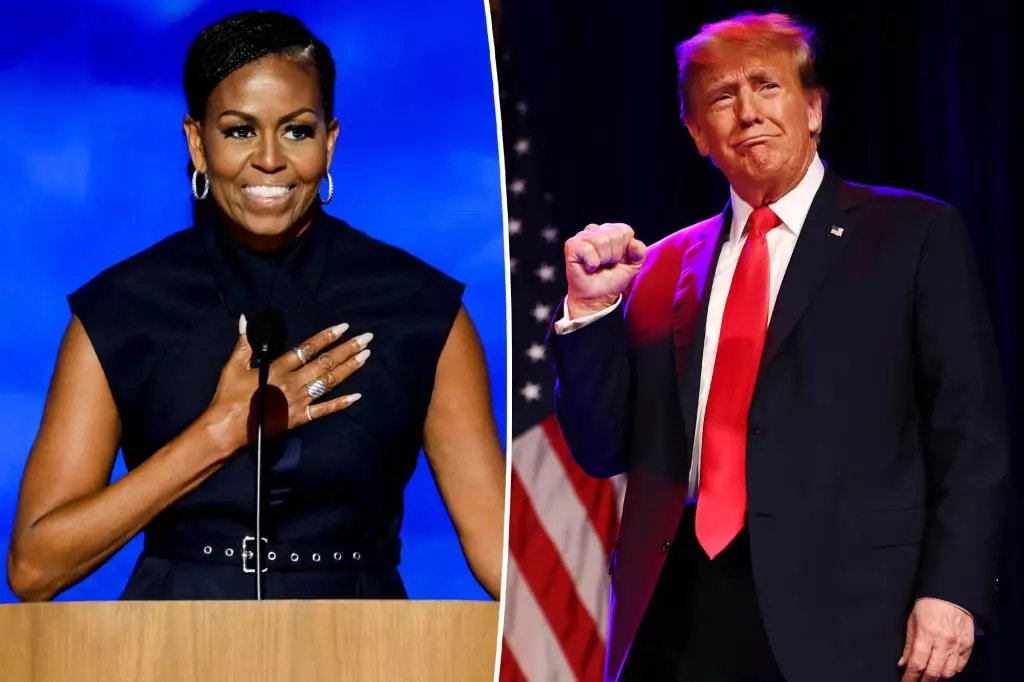When it comes to political transitions, the actions of former leaders often serve as a reflection of their principles and loyalties. Michelle Obama’s decision to skip Donald Trump’s inauguration starkly contrasts with the more congenial approach adopted by her husband, former President Barack Obama. This choice raises myriad questions about authenticity in a political landscape that often demands compromise and decorum. To comprehend the implications of her absence, we must first delve into the motivations behind it, as well as the potential messages it conveys to an audience increasingly weary of political facades.
Michelle Obama’s absence from the inauguration is not merely an act of refusal but a deliberate statement underscoring her authenticity. A source close to the Obamas articulated that she has “never been fake” and that her public appearances are always measured and intentional. This sentiment resonates deeply, especially in an era dominated by political contention and a lack of genuine engagement.
Reflecting on Michelle Obama’s statements from previous speeches, particularly during the Democratic National Convention, one can discern her opposition to Trump’s brand of leadership. By describing Trump’s agenda as steeped in fearmongering and prejudice, she positions herself against a leadership style that undermines the achievements of marginalized communities. In her speech, which resonated with so many Americans disillusioned by the Trump presidency, she emphasized her apprehension about normalizing what she saw as regressive leadership.
This criticism echoes a broader sentiment held by many who feel that the political climate warrants a more principled stance. The issue is compounded by the controversies surrounding Trump, including the “birther movement,” which unjustly questioned Barack Obama’s birthplace. Such a toxic backdrop makes it understandable for Michelle to choose non-participation as a form of protest against the normalization of divisive rhetoric.
Historically, the practice of attending presidential inaugurations has been a norm underscoring peaceful transitions of power. It serves as a symbolic gesture of unity and respect for the democratic process, often bridging gaps between parties. However, Michelle Obama’s absence initiates a significant departure from this tradition, illustrating the rift within American politics and society at large.
Her decision likely reflects not just personal sentiments but a collective recognition that respect and participation should not be extended to figures and ideologies that challenge foundational values of equality and fairness. In a climate where many Americans express growing dissatisfaction with the political status quo, Michelle’s choice becomes a powerful emblem of dissent.
What Does This Mean for Future Engagements?
While Michelle Obama has maintained a relatively low profile in political affairs since the end of her husband’s presidency, her absence at such a pivotal moment may signal a shift in how former political figures engage with the changing political landscape. Does her stance encourage other public figures to draw lines in the sand regarding their involvement? Perhaps, as citizens and former leaders alike reevaluate the extent to which they are willing to engage with figures who threaten fundamental social values.
The consequences of these decisions will undoubtedly echo through the years. As political divisions deepen, Michelle’s choice compels a re-examination of participation in political rituals, making it increasingly clear that silence or absence can often speak louder than presence.
Michelle Obama’s decision to forgo Trump’s inauguration is more than just a personal choice; it represents a broader ideology embodied in her advocacy for justice, equality, and integrity. As she continues to choose when and how to voice her opinions, her actions encourage others to consider the weight of their own choices in this polarized environment. In a world yearning for authenticity, Michelle Obama’s absence serves as a poignant reminder that sometimes, the most powerful statements are the ones left unspoken. Through her deliberate disengagement, she invites a deeper conversation about the responsibilities of leadership and the significance of aligning actions with values in an increasingly complex political landscape.

